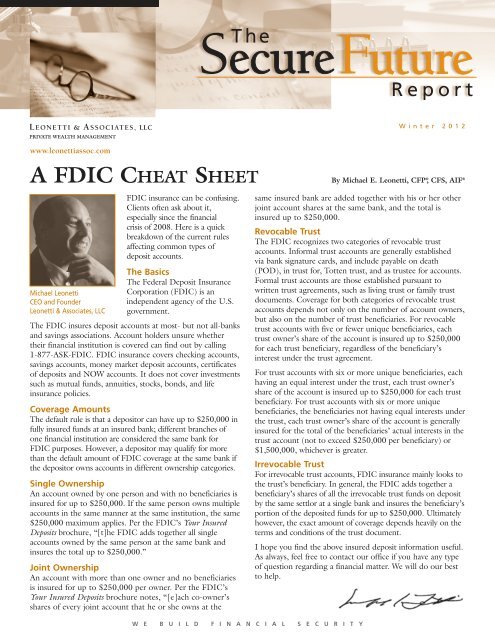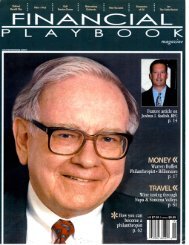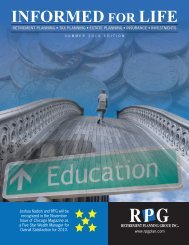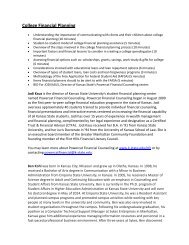A FDIC CHEAT SHEET - Leonetti & Associates LLC
A FDIC CHEAT SHEET - Leonetti & Associates LLC
A FDIC CHEAT SHEET - Leonetti & Associates LLC
You also want an ePaper? Increase the reach of your titles
YUMPU automatically turns print PDFs into web optimized ePapers that Google loves.
PRIVATE WEALTH MANAGEMENT<br />
www.leonettiassoc.com<br />
<strong>LLC</strong><br />
Winter 2012<br />
A <strong>FDIC</strong> <strong>CHEAT</strong> <strong>SHEET</strong> By Michael E. <strong>Leonetti</strong>, CFP ® , CFS, AIF ®<br />
Michael <strong>Leonetti</strong><br />
CEO and Founder<br />
<strong>Leonetti</strong> & <strong>Associates</strong>, <strong>LLC</strong><br />
<strong>FDIC</strong> insurance can be confusing.<br />
Clients often ask about it,<br />
especially since the financial<br />
crisis of 2008. Here is a quick<br />
breakdown of the current rules<br />
affecting common types of<br />
deposit accounts.<br />
The Basics<br />
The Federal Deposit Insurance<br />
Corporation (<strong>FDIC</strong>) is an<br />
independent agency of the U.S.<br />
government.<br />
The <strong>FDIC</strong> insures deposit accounts at most- but not all-banks<br />
and savings associations. Account holders unsure whether<br />
their financial institution is covered can find out by calling<br />
1-877-ASK-<strong>FDIC</strong>. <strong>FDIC</strong> insurance covers checking accounts,<br />
savings accounts, money market deposit accounts, certificates<br />
of deposits and NOW accounts. It does not cover investments<br />
such as mutual funds, annuities, stocks, bonds, and life<br />
insurance policies.<br />
Coverage Amounts<br />
The default rule is that a depositor can have up to $250,000 in<br />
fully insured funds at an insured bank; different branches of<br />
one financial institution are considered the same bank for<br />
<strong>FDIC</strong> purposes. However, a depositor may qualify for more<br />
than the default amount of <strong>FDIC</strong> coverage at the same bank if<br />
the depositor owns accounts in different ownership categories.<br />
Single Ownership<br />
An account owned by one person and with no beneficiaries is<br />
insured for up to $250,000. If the same person owns multiple<br />
accounts in the same manner at the same institution, the same<br />
$250,000 maximum applies. Per the <strong>FDIC</strong>’s Your Insured<br />
Deposits brochure, “[t]he <strong>FDIC</strong> adds together all single<br />
accounts owned by the same person at the same bank and<br />
insures the total up to $250,000.”<br />
Joint Ownership<br />
An account with more than one owner and no beneficiaries<br />
is insured for up to $250,000 per owner. Per the <strong>FDIC</strong>’s<br />
Your Insured Deposits brochure notes, “[e]ach co-owner’s<br />
shares of every joint account that he or she owns at the<br />
same insured bank are added together with his or her other<br />
joint account shares at the same bank, and the total is<br />
insured up to $250,000.<br />
Revocable Trust<br />
The <strong>FDIC</strong> recognizes two categories of revocable trust<br />
accounts. Informal trust accounts are generally established<br />
via bank signature cards, and include payable on death<br />
(POD), in trust for, Totten trust, and as trustee for accounts.<br />
Formal trust accounts are those established pursuant to<br />
written trust agreements, such as living trust or family trust<br />
documents. Coverage for both categories of revocable trust<br />
accounts depends not only on the number of account owners,<br />
but also on the number of trust beneficiaries. For revocable<br />
trust accounts with five or fewer unique beneficiaries, each<br />
trust owner’s share of the account is insured up to $250,000<br />
for each trust beneficiary, regardless of the beneficiary’s<br />
interest under the trust agreement.<br />
For trust accounts with six or more unique beneficiaries, each<br />
having an equal interest under the trust, each trust owner’s<br />
share of the account is insured up to $250,000 for each trust<br />
beneficiary. For trust accounts with six or more unique<br />
beneficiaries, the beneficiaries not having equal interests under<br />
the trust, each trust owner’s share of the account is generally<br />
insured for the total of the beneficiaries’ actual interests in the<br />
trust account (not to exceed $250,000 per beneficiary) or<br />
$1,500,000, whichever is greater.<br />
Irrevocable Trust<br />
For irrevocable trust accounts, <strong>FDIC</strong> insurance mainly looks to<br />
the trust’s beneficiary. In general, the <strong>FDIC</strong> adds together a<br />
beneficiary’s shares of all the irrevocable trust funds on deposit<br />
by the same settlor at a single bank and insures the beneficiary’s<br />
portion of the deposited funds for up to $250,000. Ultimately<br />
however, the exact amount of coverage depends heavily on the<br />
terms and conditions of the trust document.<br />
I hope you find the above insured deposit information useful.<br />
As always, feel free to contact our office if you have any type<br />
of question regarding a financial matter. We will do our best<br />
to help.<br />
W E B U I L D F I N A N C I A L S E C U R I T Y
REVIEW & OUTLOOK<br />
By Craig T. Johnson, Portfolio Manager<br />
As 2012 gets underway, there is little regret by<br />
many in the financial markets that 2011 is<br />
behind us. The past year offered an extremely<br />
difficult environment for the financial markets.<br />
Not only did the traditional institutional<br />
investor struggle with the market’s volatility,<br />
but the hedge fund industry could not find a lifeline either.<br />
The rapid up and down movements of the market continually<br />
left one trader after another on the wrong side of the market<br />
as the next market direction got underway. Commodity<br />
traders also experienced rapid turnaround, as areas of strength<br />
quickly became areas of weakness. The fixed income market<br />
was attractive, but the rapid decline in yields provided fixed<br />
income buyers with more risk and less reward.<br />
An abundance of reasons exist for the market’s extreme<br />
volatility, but none stands out more than the financial debt<br />
crisis that gripped the European Union throughout the year.<br />
Greece seemed to carry much of the blame along with<br />
Portugal, Italy, Ireland and Spain. The real problems came<br />
to light when it was realized how intertwined the other<br />
countries were and their degree of exposure to not just<br />
Greece, but also to the other financially weak members of<br />
the European Union. In addition, due to loans given to<br />
European countries the major (and I am sure minor) banks in<br />
Europe were even more exposed to the financial difficulties<br />
than were the countries making up the European Union. An<br />
unwanted story developed that began to reflect our own<br />
financial crisis in 2007-2009, as it appeared the European<br />
Union was headed for a similar fate. One item that made this<br />
potential similarity very worrisome domestically was that U.S.<br />
money market funds were holding commercial paper from the<br />
exposed European banks, a fact that led to fears of a possible<br />
breakdown of the money market fund industry that we nearly<br />
experienced a couple of years ago. A rapid reduction by the<br />
money market funds in those holdings appears to have<br />
reduced that concern.<br />
The global economy faced other difficulties in 2011. Cracks<br />
began to show in what had previously been viewed as the<br />
invincible Chinese economy: a continual battle throughout<br />
the year with inflation, skyrocketing real estate prices, a<br />
slowing economic growth rate and higher labor costs made<br />
for a difficult year for China. Brazil felt the pinch from the<br />
Chinese economy, as it had been a major exporter of raw<br />
materials to China. India, which had also been on a strong<br />
growth trajectory, experienced significant budget deficits,<br />
high inflation and slowing growth.<br />
On March 11, Japan was plagued by the Tohoku Earthquake<br />
and the tragic impact of the tsunami that followed in its<br />
wake. The disaster, in addition to the human and economic<br />
toll, also caused significant damage to three nuclear reactors<br />
and forced the evacuation of hundreds of thousands of<br />
people from their homes. The overall impact to Japan, which<br />
is the world’s third largest economy, is still being felt. The<br />
World Bank has estimated the cost of the damage to be about<br />
$235 billion, making it the most costly natural disaster in<br />
world history.<br />
In the United States, our economy also experienced slow<br />
growth. Stronger growth is needed to reduce the number of<br />
people that are out of work and to get the overall economy<br />
back on a positive track. Home prices have continued to<br />
decline, as high inventories and a lack of demand have hurt<br />
new and existing home sales. Zero or near zero interest rates<br />
created by the Federal Reserve to stabilize the banking<br />
industry have left depositors in saving accounts, CDs and<br />
money market funds with a miniscule return on their money.<br />
The loss of interest income is similar to losing a breadwinner<br />
in their family. Unfortunately, many of the people being<br />
Continued on page 4...<br />
Keep Up-To-Date With Portfolio Manager<br />
Commentary E-Mails<br />
Each Monday and once or twice during the week, Craig<br />
Johnson publishes his view of the financial markets. The Weekly<br />
Commentary provides market data for the financial markets.<br />
In addition, it offers readers a review of the prior week and<br />
outlines events that may shape stock market action in the<br />
coming week.<br />
A Market Update in the middle of the week by Fixed Income<br />
Portfolio Manager Matt Varner will highlight the taxable and<br />
tax exempt fixed income markets.<br />
If you would like to have your name added to the distribution<br />
list for these timely publications, kindly e-mail us at<br />
info@leonettiassoc.com or call (847) 520-0999 to sign up.<br />
L EONETTI & ASSOCIATES, <strong>LLC</strong> T OLL-FREE (800) 454-0999<br />
The information in this newsletter is for informational purposes only and obtained from sources deemed reliable. Its accuracy or completeness is<br />
not guaranteed and the giving of the same is not deemed a solicitation on our part with respect to the purchase or sale of any security or advisory<br />
service. <strong>Leonetti</strong> & <strong>Associates</strong>, <strong>LLC</strong> views or opinions are as of a certain date and subject to change at any time without notice. We strongly<br />
encourage readers to consult with legal or tax counsel with respect to any specific questions. Past performance is not a guarantee of future results.<br />
All investments have inherent risks. Investors may experience a loss. Clients should contact us promptly if there are any changes in their financial<br />
situation or investment objectives. Our current disclosure statement as set forth in our Form ADV is available for your review upon request. It<br />
describes our business practices, conflicts of interest, advisory services and fees.<br />
Circular 230 Notice: In accordance with Treasury Regulations which became applicable to all tax practitioners as of June 20, 2005, please note that<br />
any tax advice given herein is not intended or written to be used, and cannot be used by any taxpayer, for the purpose of (i) avoiding tax penalties<br />
or (ii) promoting, marketing or recommending to another party any transaction or matter addressed herein.<br />
W E B U I L D F I N A N C I A L S E C U R I T Y
CONTENTS MAY HAVE<br />
SHIFTED DURING FLIGHT<br />
By Sherwin M. Lesk, CFP ® , J.D., LL.M<br />
I have not flown in many years; that changed recently when,<br />
as did Billy Joel’s old friend in the song My Life, I bought a<br />
ticket to the West Coast. (As an aside, it seems to me that<br />
during my flightless years the airlines created an almost<br />
limitless number of categories of travelers entitled to priority<br />
boarding. I say “almost” in recognition of those few who,<br />
along with yours truly, made up our plane’s Seating Group 4<br />
and boarded last).<br />
For the record, I note that my fellow passengers’ land<br />
rush-like behavior in staking out the plane’s overhead bins<br />
had not changed all that much since I last took to the<br />
friendly skies. I bring up that observation not because I feel<br />
the world needs a new kvetch what with Andy Rooney’s<br />
passing, although I do. In fact, during my recent employee<br />
review, I casually mentioned to our President that one of<br />
my 2012 goals was to assume the mantle once filled by<br />
that venerable 60 Minutes’ closer and become <strong>Leonetti</strong>’s<br />
resident curmudgeon. Rather, I bring up that observation<br />
because it provides a smooth segue for the rest of this essay.<br />
But I digress.<br />
Having safely arrived at my intended destination (thank you<br />
very much) but with the plane still on the tarmac, one of the<br />
flight attendants urged my fellow passengers and me to use<br />
caution when opening the plane’s overhead bins because –<br />
everybody now – “the bins’ contents may have shifted during<br />
flight.” Good idea. Who would want a rolling carry-on<br />
landing on their head or hitting them in the face, especially if<br />
the projectile is not their luggage? As I sat there watching the<br />
frenzied baggage retrieving and lining up in the aisle activity<br />
in front of me – remember, I was part of Seating Group 4<br />
and was in the plane’s last row – it struck me that what I<br />
was observing was probably not all that dissimilar from the<br />
Israelites hastily grabbing their belongings and making their<br />
way out of Egypt albeit not through TSA checkpoints. But it<br />
also struck me that using caution is a good idea when dealing<br />
with items that may have shifted during life and not just<br />
during flight.<br />
You see, just as the overhead bins’ contents may shift during<br />
flight, so too may the personal items that you literally and<br />
figuratively carry as you make your way through life. Perhaps<br />
your job situation changes for the worse or you sense that it<br />
may soon do so. Maybe your once dual income household<br />
becomes forced to make do on only one salary. Perhaps the<br />
interest income on which you had counted to support part of<br />
your lifestyle proves to be less than you had envisioned.<br />
Maybe your health or that of a loved one deteriorates, leaving<br />
you to face a mountain of unexpected medical bills. Maybe<br />
your health care costs rise faster than you had anticipated, or<br />
your long-term health care insurance premiums skyrocket<br />
without warning. Perhaps you find yourself caring for an<br />
aging parent, or an adult child struggling to make ends meet.<br />
Maybe you long ago bought a prepaid college tuition contract<br />
and, having read recent news accounts, now wonder whether<br />
the contract will be there when needed. Perhaps your child<br />
turns out to have one or more disabilities that leave you<br />
facing years of unplanned-for expenses. Maybe a beloved<br />
family pet becomes infirm, simultaneously tugging at your<br />
heartstrings and your pocketbook in the process. Perhaps you<br />
finally had wills and trusts drawn up and you wonder how<br />
they have been impacted by recent law changes; Illinois<br />
changed its estate tax laws January 2011, and changed them<br />
again – for the better – December 2011. On the flip side,<br />
perhaps good fortune has smiled upon you and you are<br />
considering whether you should take advantage of what to<br />
some appears to be a still weak real estate market, or some<br />
other investment opportunity.<br />
Continuing to blindly follow a financial plan – whether it be<br />
one loosely formed in your head or formally committed to<br />
writing – after experiencing some turbulence in your life is<br />
just as dangerous, if not more so, as pulling the latch on the<br />
bin housing your luggage after throwing caution to the wind.<br />
Yes, having a suitcase land on your head can be painful and<br />
embarrassing, but that pales in comparison to unexpectedly<br />
running out of money on which to live, having to pull your<br />
kids out of college, having to drop long-term care coverage<br />
when you need it most, or being forced to sell the home you<br />
cherish. When you get buffeted by wind currents mid-flight,<br />
the captain turns on the fasten seat belt sign. When you get<br />
buffeted by the unexpected as your life unfolds, steady<br />
yourself. If things have changed for you, take the time<br />
necessary to think carefully about whether and how those<br />
changes may impact you now and in the future. You will not<br />
get any frequent flyer miles for your effort, but you will get a<br />
lot more mileage out of your financial plan.<br />
W E B U I L D F I N A N C I A L S E C U R I T Y
Review & Outlook<br />
continued from page 2<br />
penalized the most are living on fixed incomes and rely on<br />
interest earnings for their retirement.<br />
The foregoing problems will continue as we enter 2012.<br />
Moreover, the November elections for the President,<br />
Senate and House along with local municipal races will have<br />
an impact throughout the year. At this time of year when<br />
so many try to predict the unknown, it is important to<br />
remember that the financial markets are often never as bad<br />
or good as predicted. This year will offer many challenges<br />
and it will also offer many opportunities. It should be a<br />
most interesting year.<br />
NEWS & NOTES<br />
Michael <strong>Leonetti</strong> was featured in the 2011 Best<br />
Financial Advisers For Doctors supplement that<br />
appeared in the November 2011 issue of Medical<br />
Economics ® magazine.<br />
Pardon our Dust! The <strong>Leonetti</strong> website has been<br />
recently under construction. Look for the premier<br />
of our new and improved website before the end<br />
of February.<br />
<strong>Leonetti</strong> & <strong>Associates</strong>, <strong>LLC</strong> was selected to be part of the MD Preferred Service Network.<br />
Only select NAPFA-Registered Financial Advisors are chosen as premier providers to the<br />
medical profession. We are proud to have earned the MD Preferred Financial Advisor Medallion,<br />
and look forward to serving physicians and their families in our community.<br />
LEONETTI &<br />
ASSOCIATES, <strong>LLC</strong><br />
1130 LAKE COOK ROAD, SUITE 300<br />
BUFFALO GROVE ILLINOIS 60089-1976<br />
TOLL-FREE (800) 454-0999<br />
PRSRT First Class<br />
U.S. Postage<br />
PAID<br />
Permit No. 251<br />
Schaumburg IL






